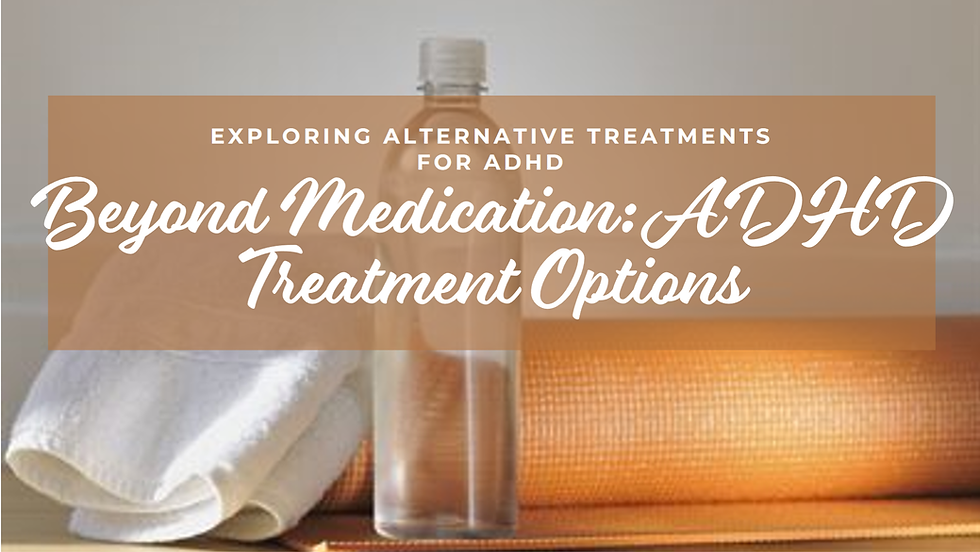Treatment Options for ADHD: Medication and Beyond
- Admin
- Jan 22, 2024
- 2 min read
Updated: Apr 12, 2024

Attention-Deficit/Hyperactivity Disorder (ADHD) is a common neurodevelopmental disorder that can significantly impact an individual's life. While there is no cure for ADHD, a range of treatment options are available that can help manage its symptoms. This article delves into the various treatment approaches for ADHD, focusing on medication and extending to alternative therapies.
Introduction to Treating ADHD: (www.youtube.com/kneetiegorungo)
Effective treatment for ADHD often requires a multi-faceted approach tailored to the individual's specific symptoms and needs. It typically involves a combination of medication, therapy, lifestyle changes, and educational support. Understanding the range of treatment options available is crucial for individuals with ADHD and their families to make informed decisions.
Medication for ADHD:
Medication is a cornerstone of ADHD treatment and can be highly effective in managing symptoms. The two primary types of medications used are stimulants and non-stimulants.
Stimulants: These are the most common medications used for treating ADHD. They work by increasing levels of certain neurotransmitters in the brain, which helps improve concentration and reduce impulsivity and hyperactivity. Examples include methylphenidate and amphetamines.
Non-stimulants: These medications are usually considered when stimulants are ineffective or cause undesirable side effects. They may take longer to start working compared to stimulants but can be effective in improving focus and attention. Examples include atomoxetine and guanfacine.
Medications are not a one-size-fits-all solution and must be carefully managed by healthcare providers to minimize side effects and find the optimal dosage.
Behavioral Therapy:
Behavioral therapy is a vital part of ADHD treatment, especially for children. This approach focuses on changing negative behavior patterns into positive ones. Techniques include behavior modification, which involves setting up a system of rewards and consequences for specific behaviors, and cognitive-behavioral therapy (CBT), which helps in managing emotional responses and developing coping strategies.
Lifestyle and Dietary Changes:
Lifestyle changes can also play a significant role in managing ADHD symptoms. This includes:
Regular Physical Activity: Exercise can help improve concentration, decrease impulsivity, and stabilize mood.
Healthy Diet: While no specific diet is recommended for ADHD, a balanced diet rich in fruits, vegetables, whole grains, and lean proteins can support overall brain health.
Adequate Sleep: Ensuring sufficient sleep is critical as lack of sleep can exacerbate ADHD symptoms.
Educational Support and Accommodations:
For children with ADHD, tailored educational support is essential. This may involve individualized education plans (IEPs), 504 plans in the U.S., or other accommodations that provide a supportive learning environment.
Alternative Therapies:
Some individuals may find benefit in alternative therapies such as yoga, meditation, or biofeedback. While these should not replace mainstream treatments, they can be complementary.
Conclusion:
Treating ADHD is a comprehensive process that goes beyond medication. It encompasses a blend of medical, psychological, educational, and lifestyle approaches. Each individual’s treatment plan should be customized to their unique needs, ensuring the best possible outcome. With the right combination of treatments, individuals with ADHD can lead productive and fulfilling lives.
The domain www.dubaitelemedicine.com is for sale. Please contact us at www.kneetie.com
#KneeTie #Stroke #youtube/kneetiegorungo #DubaiTelemedicine



















Comments